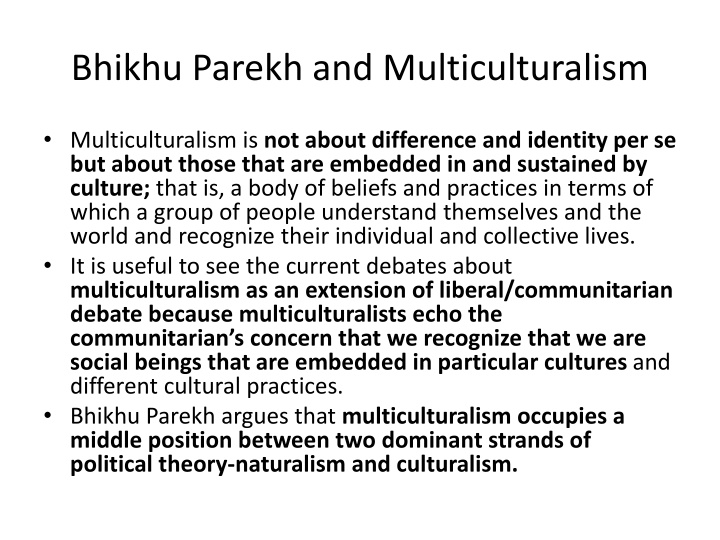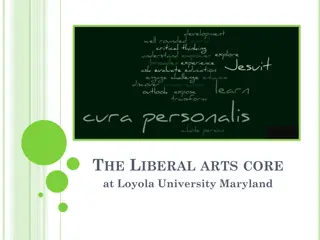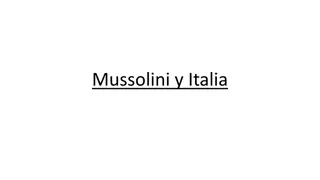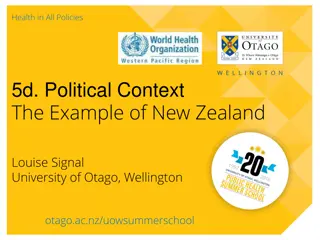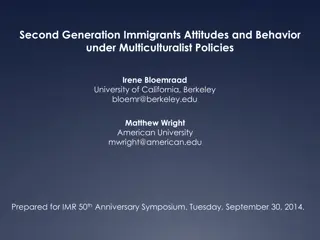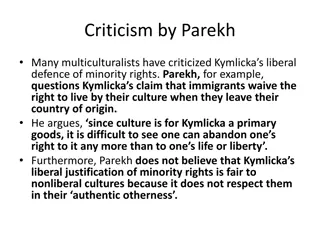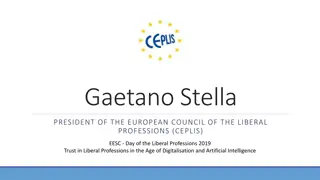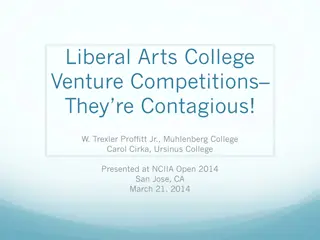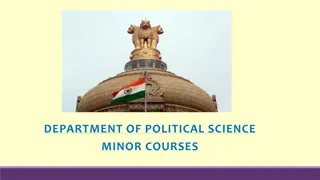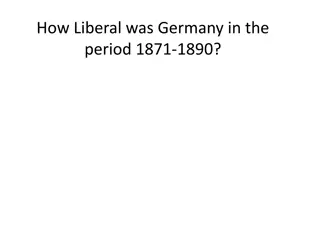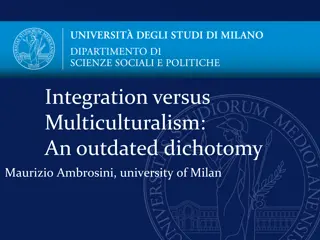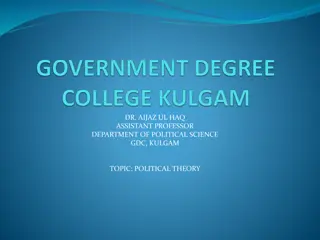Challenges of Multiculturalism in Liberal Political Theory
Bhikhu Parekh discusses multiculturalism as a middle ground between naturalism and culturalism in political theory. He highlights the importance of cultural plurality in contemporary liberalism, critiquing the assimilationist approach. He addresses the challenges multiculturalism poses for liberals, particularly regarding demands for corporate cultural rights conflicting with traditional liberal values emphasizing individual rights and equal treatment.
Download Presentation

Please find below an Image/Link to download the presentation.
The content on the website is provided AS IS for your information and personal use only. It may not be sold, licensed, or shared on other websites without obtaining consent from the author.If you encounter any issues during the download, it is possible that the publisher has removed the file from their server.
You are allowed to download the files provided on this website for personal or commercial use, subject to the condition that they are used lawfully. All files are the property of their respective owners.
The content on the website is provided AS IS for your information and personal use only. It may not be sold, licensed, or shared on other websites without obtaining consent from the author.
E N D
Presentation Transcript
Bhikhu Parekh and Multiculturalism Multiculturalism is not about difference and identity per se but about those that are embedded in and sustained by culture; that is, a body of beliefs and practices in terms of which a group of people understand themselves and the world and recognize their individual and collective lives. It is useful to see the current debates about multiculturalism as an extension of liberal/communitarian debate because multiculturalists echo the communitarian s concern that we recognize that we are social beings that are embedded in particular cultures and different cultural practices. Bhikhu Parekh argues that multiculturalism occupies a middle position between two dominant strands of political theory-naturalism and culturalism.
Naturalism and Culturalism The former is espoused by a diverse array of philosophers ranging from Greek and Christian philosophers to Hobbes, Locke and Mill. They assumed that human nature was unchanging, unaffected in its essentials by culture and society, and capable of indicating what way of life was the best . Culturalists, on the other hand, like Vico, Montesquieu, Herder and the German Romantics, argued for the opposite view. They believed that human beings were culturally constituted, varied from culture to culture, and share in common only the minimal species-derived properties from which nothing of moral and political significance could be derived . But according to Parekh, both these positions are deeply problematic.
Cultural Plurality and Contemporary Liberalism Multiculturalists, according to Parekh, share the conviction that cultural plurality must figure prominently in our theorizing about how we ought to live together collectively as a society. But contemporary liberalism ignores this plurality when it endorses the assimilationist politics of equal citizenship. Besides, as liberals believe that their theory is culturally neutral they are blind to the fact that they unfairly privilege the interests of the cultural majority over the interests of cultural minorities.
Multiculturalism-Problematic for Liberals Multiculturalism has proved particularly problematic for liberals, since demands for self-government frequently imply corporate cultural rights, that is to say rights that are exercised not by individual members of a particular community, but by the collective as a whole. At first sight, such demands for Individuals being corporate cultural rights appear to run counter to the traditional liberal vision of the state as protector and promoter of individual rights and interests. Individuals are considered as ends in themselves and thus they have equal moral status and deserve to be treated with equal concern and respect by government. Therefore, They should have the same fundamental rights and entitlements. This emphasis upon the individual has continued to inform many liberal responses to the politics of differences . Thus, while liberals such as Habermas accept that a commitment to genuine equality may entail special cultural and social rights, they stress that such rights should be conceptualized as individual rights.
Parekhs Thesis Parekh s thesis stems firstly out of a rejection of relativism and monism and subsequently from the claim that liberal attempts to respond to the fact of multiculturalism do not take the concept of culture seriously enough. In identifying the faults of these theories he lays the ground for an argument about the nature and importance of culture to human existence and argues for a politics based on intercultural dialogue. In doing this Parekh engages with the very thorny issue of intercultural evaluation of disputed practices such as arranged marriages, polygamy, female circumcision, ritual slaughter of animals, etc. Parekh also addresses the relationship between minority cultures and the operative public values of society.
Parekhs Thesis---(Contd.) The very basis of Parekh s political theory is the attempt to give adequate expression to the interplay between these three features stated earlier. Relativism and monism are clearly to extreme. We must not overemphasize difference and we must not overemphasize similarity. It is a balancing act that Parekh also believes that contemporary liberal responses to diversity have failed to pull off.
Parekhs Criticism of Rawls Political Liberalism Parekh believes that Rawls work is deeply inhospitable to cultural plurality. He argues that Rawls political liberalism unduly restricts political discourse. Allowing people into society provided they leave their moral and religious baggages at the door, is to bar important resources from political debate. To offer only a unitary concept of individual citizenship is to deny cultural pluralism a voice from the outset. In Parekh s view, Kymlicka s liberal multiculturalism does not fare much better. Parekh explicitly picks up on the point that there appear to be no general or undisputed principles that inform Kymlicka s hierarchy of national refugee and immigrant minority rights. If culture is a primary good in that it is a necessary condition for the good life, then are we right to deny immigrants access to their culture?
Parekhs Attack on Kymlickas Liberal Absolutism Parekh also believes that Kymlicka absolutises liberalism . His pervasive suggestion that national minorities are to be given self-government rights provided they govern themselves within certain liberal parameters fails to take cultural diversity seriously enough. Instead of relativism, monism and the attempts of liberals such as Rawls and Kymlicka to develop a minimum universalism, Parekh s theory takes the form of pluralist universalism . Pluralist universalism entails a particular view of human nature, of culture and of morality itself. Our nature is formed not merely from the basic characteristics of shared physical and mental structure, the same basic needs and the common condition of growth but in tandem with our active participation in nature.
Parekhs Pluralist Universalism This is what Parekh means when he says that humankind are culturally embedded. Culture being so important in this dialectic, and because culture is by definition a social or group concept, we need to be able to conceive of people not merely as individuals but as part of a collective group or groups. For Parekh, the rights of cultures are primary collective rights .
